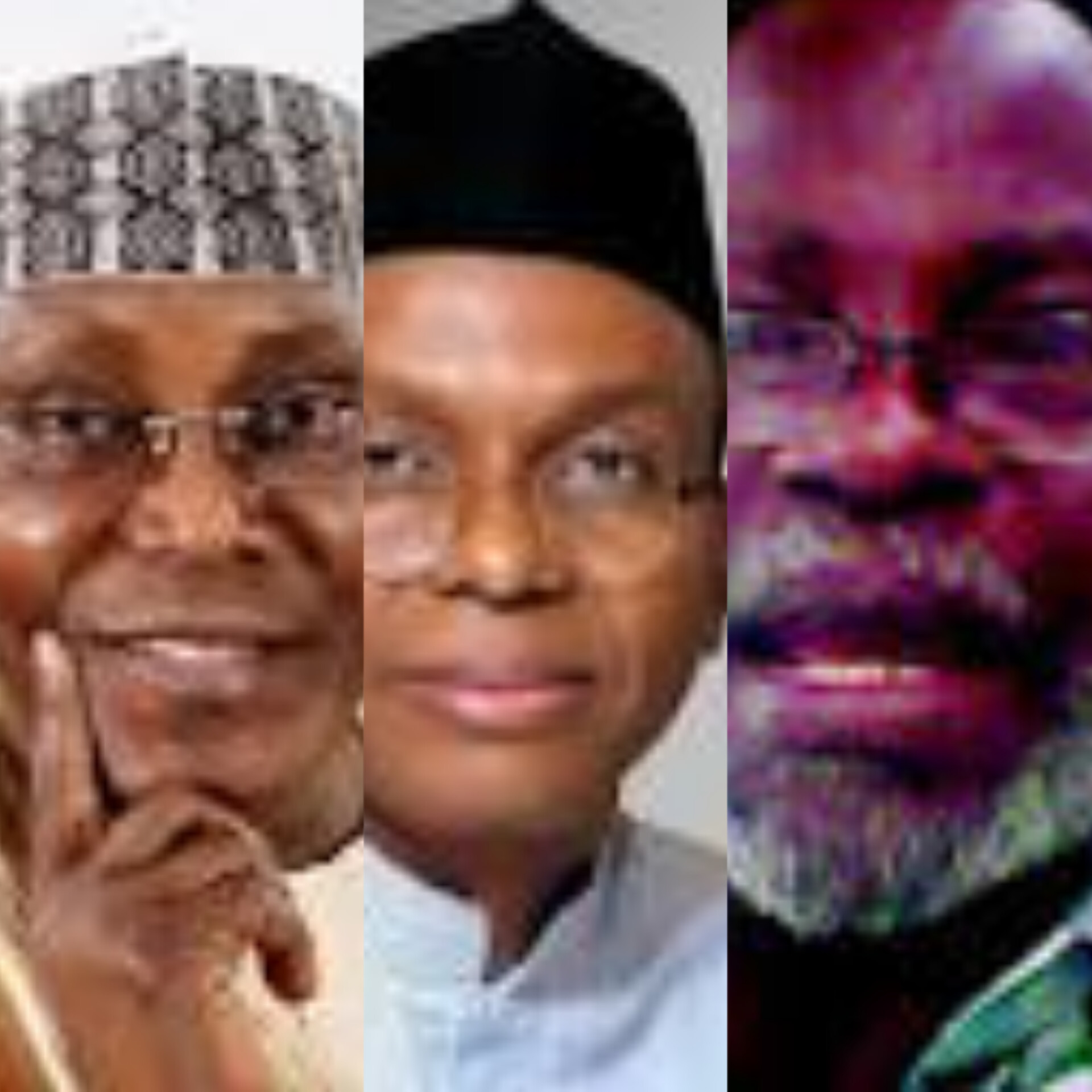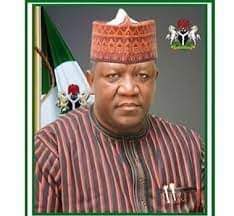By Tunde Olusunle
For those who may not know, Atiku Abubakar, Nigeria’s former Vice President and presidential flagbearer of the Peoples’ Democratic Party, (PDP), is an extremely organised character. He is a system’s person who is meticulous, painstaking and regulations-compliant. Ask those who know him closely, or have worked with him in the past. Ask Chris Mammah, (his former media adviser); Abdullahi Nyako, (his principal private secretary); Azu Ndukwe, (his longserving personal physician), or Olusola Akanmode, (his erstwhile chief of staff).
You may also ask Olusegun Ajuwon, (his former family physician) or Jide Adeniji, (his close associate). Both gentlemen had known Atiku many years preceding his emergence at the highest hierarchies of our contemporary democratic dispensation, back in the days in Yola. How about Andy Okolie, (subsisting head of Atiku’s secretariat) or Tokunbo Adeola, (one of his former aides), who continues to be in close contact with Atiku? I should also know a thing or two about his work regimen too, after being associated with him for two and half decades now. Atiku typically has his plans and itineraries, which define his local and international engagements, all pre-planned and worked out. Except of course for emergencies and save-our-soul situations, which may precipitate adjustments.

My first encounter with Atiku was back late 1998. Mammah who previously had a relationship with Atiku, had joined us in the publicity directorate of the “Obasanjo Presidential Campaign Organisation.” He had risen to be deputy editor in The Punch in the early 1990s, and branched out to float a news magazine, The Week. He received support and encouragement from Atiku, who was more or less the quiet proprietor of the publication. Onyema Ugochukwu, our revered senior professional colleague, was the director of publicity. I was also on the team as the “mobile component” of the department, ever present with Obasanjo as he travelled around the country cultivating delegates and supporters, ahead of the presidential primary, scheduled for early 1999. I took notes, filed news stories and wrote articles. Ugochukwu was the professional leader of the directorate and administrator as well.
It was, at that time, a fait accompli that Atiku would be the first governor of Adamawa State, in the fourth republic. Aside this, however, Atiku was be the new leader of the Peoples’ Democratic Movement, (PDM), a pan-Nigerian political organisation, established by Shehu Musa Yar’Adua, deputy to Obasanjo during his days as military head of state. Yar’Adua, elder brother to Umaru Yar’Adua, had rapidly metamorphosed into formidable politician and political force post-retirement from the military, whose pan-Nigerian political whirlstorm, threatened the military administrations of Ibrahim Babangida and Sani Abacha, respectively. He died in controversial circumstances in incaceration, under Abacha’s watch.
Atiku, hitherto the deputy to Yar’Adua, was formally consecrated leader of the movement. Besides being governor-in-waiting for Adamawa State therefore, he was a force to be reckoned with in the emerging national political calculus. Mammah thought
Ugochukwu should meet Atiku formally and got him an appointment. I tagged along with them to the Victoria Island, Lagos home of the latter. We were well received by Atiku, famous for his public relations savvy, even as he ushered Ugochukwu into a private section for their short meeting. Ugochukwu would later share with me in the car and we drove back, that Atiku came forth to him as a “risk taker,” a daring person.
Following the January 1999 gubernatorial elections, Atiku was to become the rallying point of most of his governor colleagues. They deferred to him for guidance and mentorship.
We will yet discuss Atiku’s emergence as running mate to Obasanjo, and subsequently, the Vice President. Early in the life of the administration, however, Atiku swiftly demonstrated his capacity as a pragmatic problem-solver. Recognising his limitations in terms of the number of aides he could engage to work with him, he reached out to friendly governors to relieve him of the burden. His argument: “These people worked for us, they have been with us. We cannot throw them away, we will still need them.” Indeed, at the point his Principal, Obasanjo was in a bind about how to accommodate the pool of technocrats who assisted with the presidential project, Atiku it was who made a brilliant suggestion to the President, to the latter’s eternal relief.
Obasanjo had requested the National Assembly, to approve his appointment of 12 Special Advisers, which worked out at two per geopolitical zone. Having spontaneously filled the slots, however, Obasanjo still had several scholars and tested professionals, in the lurch. How were notable personalities like Ahmadu Ali, (a former Minister of Education under the military, then referred to as “federal commissioner”); Haroun Adamu, (political scientist and university scholar) and Stanley Macebuh, (distinguished journalist and scholar), to be incorporated into the emerging scheme? How about an Onyema Ugochukwu who was roundly criticised by his Igbo kinsmen for working for Obasanjo, when an Alex Ekwueme was also running? There were others like Ad’Obe Obe, (respected journalist and resource person); Babalola Borishade, (a professor of chemical engineering) among others.
Since Obasanjo didn’t require the parliament’s approval of aides like Special Assistants, (SAs) and Personal Assistants, (PAs), Atiku ingeniously reckoned that a new deck of adviser-level appointees could be created to take in deserving technocrats. Obasanjo bought the idea of having an aggregation of quality “Senior Special Assistants,” (SSAs). He had sound sleep once that was sorted out. It is a measure of the quality and capacity of many appointees within this pool and bracket, that they were serially detailed to higher responsibilities. Ahmadu Ali went on to become the National Chairman of the PDP; Borishade was upgraded Minister, while Ugochukwu was entrusted with the responsibility of pioneering the actualisation of Obasanjo’s pet project, the Niger Delta Development Commission, (NDDC).
Atiku shocked many when he took up the gauntlet to appear in person in an exclusive,ctop-notch Lagos nightclub, to meet regular Nigerians and answer inquiries about the administration which was just settling down, way back in 1999. This was several years before Vice President Yemi Osinbajo’s publicised, pre-election visit in 2019, to the Afrika Shrine, a prominent events centre and address of Femi Anikulapo-Kuti, scion of the afrobeat exponent, Fela, in Lagos. The Niteshift Coliseum, hitherto the Numero Uno hub of entertainment and networking in Lagos, invited Obasanjo to its signature event, The Grand House Reception, (GHR). Before the date the event was to hold, however, Obasanjo had proceeded on a pre-scheduled foreign engagement. Atiku desired to make the point that his boss was not averse to attending the programme, but for his trip abroad. He volunteered to stand in for his principal. Did Ugochukwu perceive this side of Atiku when he suggested he was a “risk taker?”
Here was a Fulani man, a muslim, Nigeria’s second-in-command, obliging to participate in an event in a discotheque, supposedly! Mammah, Onukaba Adinoyi-Ojo and I, erstwhile regulars at Niteshift, accompanied Atiku. Proprietor of the place, the self-styled Guv’nor, Ken Calebs-Olumhense, led the welcome party. Reuben Abati, yes, our same Abati of The Guardian, Thisday and Arise Television variously, my good friend, was the compere. Trust the crust and cream of the media and entertainment to be in attendance at such high tension gbedus, as such high octane events at the Coliseum were described. The Ray Ekpus, Yemi Ogunbiyis, Taiwo Obileyes, the younger Nduka Obaigbenas, Ohi Alegbes, Ide Eguabors, Ehi Brimahs, Seye Kehindes, Mayor Akinpelus and so on, were at the event.
Atiku sat through the questions posed to him at the Celebrity Interview, by the very excited and enthusiastic audience and answered them confidently, diligently, not losing his composure for a minute. He sat through the drill for well over an hour, to the unnerving distress of his protocol and security aides. In-house nightclub services proceeded side-by-side with the interactive session, lagers and liquors, wines and spirits making the rounds, before an unperturbed Atiku. He received a standing ovation after the official segment of the event, but the audience requested him to dance to one song before he exited!
You couldn’t but envy Atiku’s taste for quality, and his deliberate exertions in talent-hunting as an administrator. As a media professional myself who served in the Official Secretariat of the President, I was eternally envious at the content and quality of my professional colleagues in the Vice President’s wing of the State House. Onukaba, (holder of a doctorate), who just returned from his tour of duty as chief executive of the Daily Times, was SSA. Garba Shehu, (yes the same one who speaks for President Muhammadu Buhari) and Adeolu Akande, (now a professor and Chairman of the Board of the Nigerian Communications Commission, (NCC), were Special Assistants. Remarkably, both Shehu and Akande despite their privileged positions, have not lost touch with their friends and primary constituency. Shehu locates you in a function and comes over to exchange pleasantries and handshakes. Akande picks your call at the first dial, ever humble and unassuming, a true Yoruba omoluabi.
Chike Okolocha, (now a university professor) was speechwriter, while Andy Okolie, (who holds a doctorate), managed the VP’s paperwork. If you’ve noticed the ethno-religious imbalance in the incumbent government, you cannot but applaud the striking cosmopolitanism of Atiku’s official configuration. It complemented the prototype in the President’s section of the presidential villa. Both men tallied in their preference and recognition for the content of the vessel, not its colour. This is the enervating perspiration Atiku brings to governance and administration. Unfortunately, Atiku was serially misconstrued and misrepresented on this score, as being over-ambitious in setting up a personnel infrastructure which depth and diversity, which could almost run the media office of the United Nations, (UN)! The spin was: Why did he require such a formidable team, if he wasn’t thinking of upstaging his boss in anyway? Whisperers exacerbated tensions between both big men and here we are.
Atiku shocked me at midnight on Saturday March 30, 2005. It was a landmark birthday for me, and my friends had come from far and near to celebrate with me. Tivlumun Nyitse, (incumbent chief of staff to the Benue State governor); Segun Ilori, (an attorney and legal adviser to an energy firm), and Tunji Bamishigbin, (also an attorney and reputable film director), among others, were in town. We ended up in a pub in Abuja’s city centre, we had drinks and refreshments. In the music-filled din of the arena, I got a telephone call, well past midnight. I picked it up and the caller said I should hold on a second to speak with Turaki. “Turaki” was Atiku’s titular brand for decades, until his upgrade to Waziri just a few years back. I was astonished. “Tunde, congratulations on your milestone…” I was trying to explain that my location was noisy, and I wanted to step out, but he continued. “Never mind, Tunde, have fun. I’m happy for you. I wish you many happy returns of today. You will receive my congratulatory letter later this morning and something to ensure that the celebration continues!” That was the Number Two man in Nigeria straining his voice on phone just to wish me well.
Sunday March 5, 2017, Nigeria lost one of its finest journalists and plawrights, Onukaba Adinoyi-Ojo. He died escaping from robbers by fleeing into the bush, only to be killed by a car which lost control, while escaping from the robbers, close to Akure in Ondo State. Upon hearing about the sad and unfortunate development, Atiku’s immediate concern was the education of Onukaba’s children. He knew my very close relationship with our departed friend and his family, and told me of his intention to set up an endowment fund, specifically for the education his kids: “You and your team are not to entertain shopping lists, Tunde. This is strictly about the education of Ojo’s children,” he admonished.
He would later inform me that he had in the past, helped out with the education of the children of friends and indeed people he barely knew, who passed on, midlife. Chike Chigbue, a Senior Advocate of Nigeria, (SAN), a vibrant attorney and personal solicitor for Atiku, and Godwin Agbroko, a respected journalist who Atiku barely ever knew, featured on the list. Onukaba’s children were all pretty young, the eldest being 14 when he died. The youngest was just about a year old. Bimbo Daramola, a former federal parliamentarian and I collaborated to arrange a formal launch for the Endowment Fund. A “Board of Trustees” for the Onukaba Adinoyi-Ojo Endowment Fund, was duly registered with the Corporate Affairs Commission, (CAC) and I was appointed Chairman of the body.
Instructively, apart from his financial contribution to the Fund, which remains the biggest individual intervention, Atiku promised to grant full scholarships to any of Onukaba’s children who desired to study at the American University of Nigeria, (AUN), Yola, owned by him. Asuku Onukaba, who was 16 in 2019, applied for admission into the institution and met all the entry requirements. Atiku was away in Dubai and I reached him through his “mobile secretariat,” ably manned by Nyako and Okolie. On August 19, 2019, Atiku conveyed his approval of full scholarship for the young Onukaba, to study his desired Software Engineering programme. That date remains a landmark in the Onukaba family.
The typically thorough Atiku advised the President, (equivalent of Vice Chancellor) of the AUN at the time, Dawn Dekle, to liaise with me on the subject. Relevant university officials, notably Usman Isa of the admissions office were equally detailed to be in touch. Happily too, on ground at the AUN to provide fatherly cover for Asuku, was our friend and colleague, Dan Okereke, Director of Communications in the institution, who knew his late father well. We all kept communicating until Asuku safely arrived Yola, Tuesday August 27, 2019, with his stepmother, Maimunat Onukaba and were picked up by university officials. Asuku’s scholarship package as approved by Atiku was so comprehensive that it entitled him to a brand new laptop! The one he took along from home which he won during an inter-school competition, therefore, had to be returned.
Asuku resumes into 400 level later this month, gradually inching towards the completion of his degree programme. The Board of Trustees of the Onukaba Adinoyi-Ojo Endowment Fund, didn’t go lounging in Atiku’s corridors or waiting forever for his return from his foreign trip, to make progress on the issue. All of these were resolved by the grace of technology. We were also dealing with an e-savvy personality, who even in old age, humbled himself to return to the classroom, to study for a masters degree in international relations from the Anglia Ruskin University, United Kingdom.
I won’t forget the genial, jovial side of Atiku. We were in his house one of those days and he invited us over to dinner table. Atiku’s charisma regularly keeps people around him. It was a buffet, and we all had to stand in a file while people took their rations, went round and returned to their seats. Atiku came in my direction en route to accessing his seat. Tried as I could, the access was still constrained. Looking at my face, he threw one at me: “Tunde, see how your big belle has taken up the whole space. You don’t want me to pass, abi?” The room erupted in raucous laughter!
And that is the Atiku Abubakar you just may not know.
Tunde Olusunle, PhD, poet, journalist, author and scholar, is a Member of the Nigerian Guild of Editors, (NGE).




